Along the Way
| August 23, 2022As we wend our way through cities, as we visit distant countries, as we travel and explore, we make unexpected discoveries. Eight stories
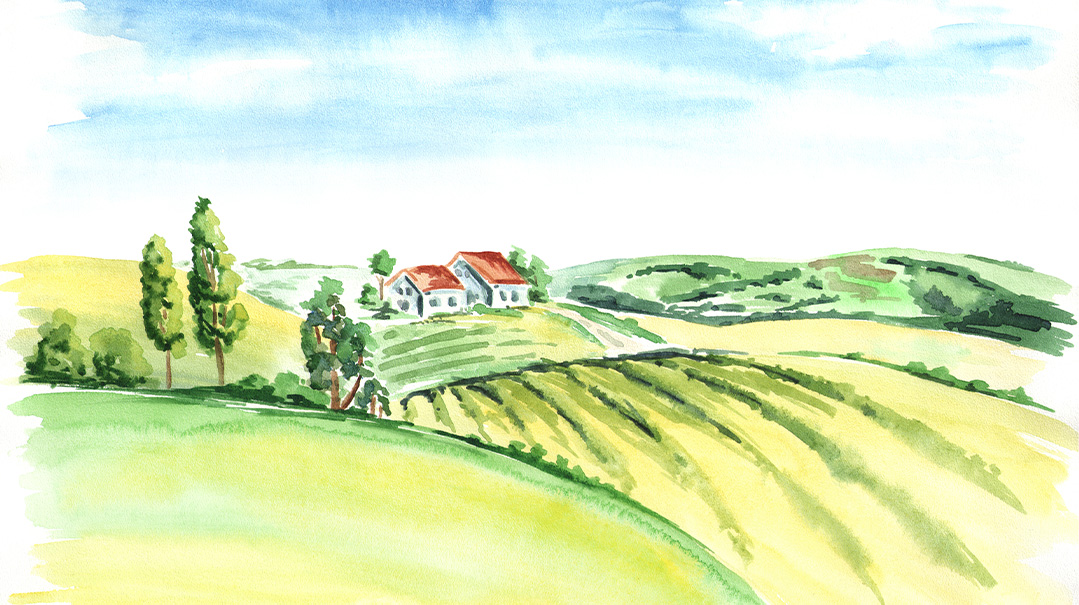
Family Farm
Shevy Levine
We’re somewhere between one Covid lockdown and the next when we decide to take a family trip to Netanya for some much-needed air. Our itinerary is packed, our days full. We spend mornings at the beach, afternoons at various attractions in the area.
We’re not the only ones bitten by the travel bug; most places we go are packed with families just like us — young and chareidi and oh-so-familiar. There’s a beauty in the sameness, a comfort in spending our vacation surrounded by those on our wavelength.
On the second day of our trip, we set out to a vegetable farm. It’s out of the way, and no one I know has ever visited the place, but the thought of introducing our little ones to food growing from the ground (!) is too exciting to pass up. We follow one dirt road, then another, bumping along narrow roads, until finally, we arrive.
The kids bound out of the car, eager to stretch and move. My husband and I unbuckle… and immediately do a double take.
The farm is empty, but the market behind the farm is full. It’s well into the 90s outside, and everyone is masked. Sandals and flip-flops abound, sleeves and head coverings do not. I gulp. Chareidi-chiloni tensions, always simmering in this tiny country we call home, had reached an all-time high in recent months. First it was elections and Covid, then Covid and elections, and now elections and Covid again.
The issues rotated and returned at a dizzying pace, all enmeshed and entangled, blared across the headlines on both sides of the divide. Sadly, no matter how obscure or inane the details, the tension that resulted couldn’t be ignored. Or so they said.
My husband went inside to pay, while I prepped the kids, snapping on masks and tucking in shirts, praying that they please, please behave, and not do anything to make this awkward situation any worse. Let’s just get out to the fields, I thought. Out in the open, away from judgmental eyes, we would be free to do our thing.
Surprisingly, our guide, Oriya, didn’t seem to be in a hurry. Wearing long slacks, hair tied into a bun, she helped us navigate the crops, peppering us with comments and questions that seemed more curious than annoyed. We chit-chatted about the kids and our origins; we spoke about what it’s like to live abroad and what it’s like to live on a farm. Oriya spoke only Hebrew, I speak English, but somehow, it worked. The discomfort I felt earlier began to thaw. Oriya was sweet, and helpful, too. Why had I been so worried?
We moved from potatoes to kale, then radishes, the sun beating down on our backs. The kids were in their element, thwacking weeds and digging dirt with the shovels and tools Oriya provided. They clutched their precious findings in large brown sacks, proud of their yield. And yet, I couldn’t help but wonder — the quantity of vegetables we’d picked seemed so sparse compared to the amount of land we covered. Were we just poor farmers, or was there something up with the farm?
“Shemittah,” Oriya explained. “We’re getting ready, preparing. It’s less than a year away.” Noticing my expression, Oriya laughed. “Yes, yes. They all come here, the chareidi schools, the chareidim, they come to see.”
We walked back from the fields together, this time with Oriya pointing out all the details I’d missed: the sectioned-off corner for peah, the cordoned-off trees for orlah, the posted signage regarding terumos and maasros. How had I not seen this? I wondered. How had I not seen her?
We meet Oriya’s husband. He stands together with a few other men, all of them sporting large canvas hats and rugged shorts. “Mi habaal habayit po?” my husband asks, taking out his wallet. One of the men points upward, and then we know that these fields belong to him. They’re his — and His. We press bills into the man’s hand and ask him to bentsh our children.
My children climb back into the car, clutching their vegetables close. It’s sticky and hot, and we’re eager to get on the road, but a part of me wants to hold the moment forever.
The headlines, the news, the great brotherly divide — it may all be true. We as individuals, as groups, as a nation, have a long way to go. But in a moment of piercing clarity, I know. There’s so much to see, so much to learn. I think of what could have been a missed chance — an afternoon spent elsewhere, in the comfort of same. And I think of a day spent out in the fields, surrounded by growth and growing, stretching and becoming, eyes open, ready to learn and gain.
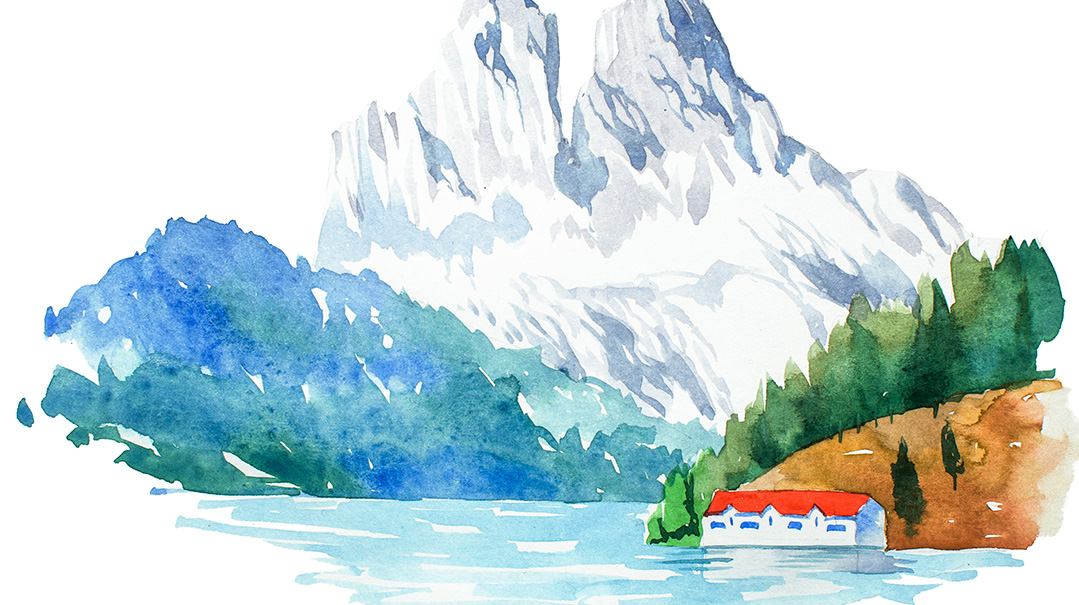
Accidental Mission
Mindel Kassorla
Some vacations are planned down to the last detail. Others are a happy accident. On my way from Eretz Yisrael to New York for my chasunah, I spent an unexpected night in Switzerland.
It started with a delayed flight at Ben Gurion and a stopover in Geneva. Unfortunately, the Swiss were perfectly punctual, and I, along with two other single girls and three bochurim, missed the connecting flight to New York.
The six of us post-seminary/yeshivah students trying to navigate a foreign, French-speaking city without actually speaking to one another was something out of a comedy skit. I became the “elected” ambassador between the boys and the girls (likely because I was no longer eligible, evident by the fact that I was carrying my wedding gown).
With the help of some rusty French I remembered from high school — “Je veux l’aide” — we eventually made it past the security checkpoints and found our way to the airline’s customer service desk.
There, we were informed that the next flight was on the following day, but we were each entitled to our own room in a nearby hotel, as well as food and travel passes for the city. The food passes were useless to us, but we figured we could probably find a Chabad.
My phone was working (at a rate per second higher than the current gas prices) so I was able to call my family and get information about the local Chabad. We reached out to them and got minyan times and the offer of dinner. Then we hopped on the next bus and got our free tour of Geneva.
When we arrived at the Chabad, we were presented with a delicious example of mi k’amcha Yisrael — they made us a private barbecue! After dinner, I went back to the hotel with a breakfast package courtesy of our new friends.
That night in the hotel was comfortable, but lonely. I called my chassan for some chizuk and company. As much as I was enjoying my all-expenses-paid stay in Geneva, I just wanted to get home already to see him and my family.
“You can really take advantage of this opportunity,” my chassan told me.
“What opportunity?” I asked.
I will never forget what he told me that night. “Daven Maariv.”
“Why? I never daven Maariv, I mean, I have time but—”
“Mindel, who knows if a frum Jew has even been, or ever will be, in that room again,” my chassan said. “You have the koach to bring kedushah to a random place in a far-off corner of the world. Don’t miss the opportunity.”
And so, when I hung up the phone, I davened one of the best Maarivs of my life.
Sometimes, we’re given the opportunity to daven in the holiest places. And sometimes, when we land in a place by “accident,” it’s because Hashem sent us there to make it holy.
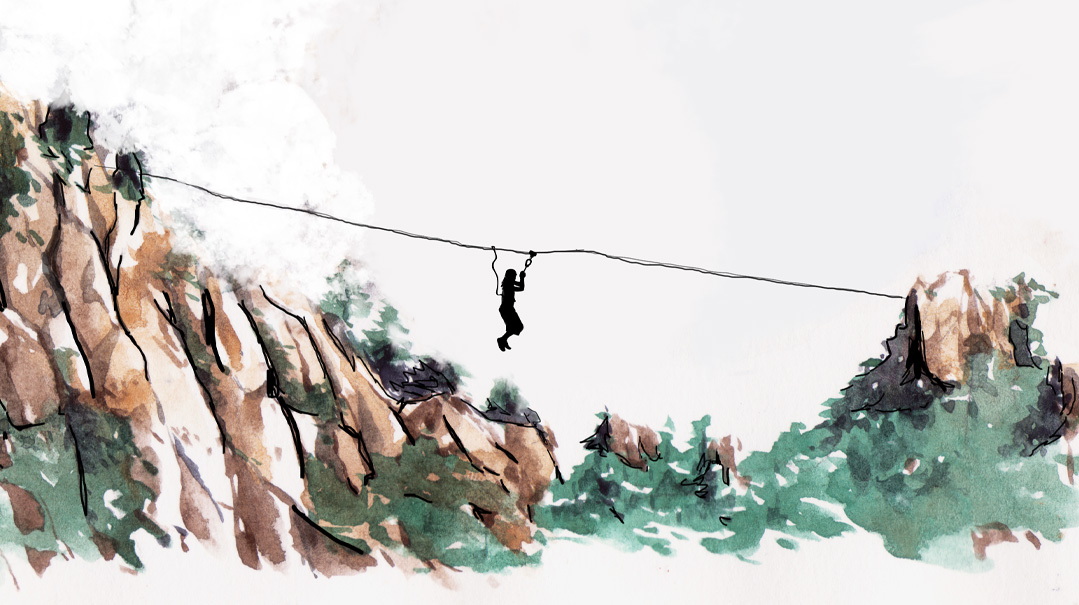
Zipping Along
Rebecca (Feldbaum) Steier
For their bar mitzvah present, our two oldest grandsons wanted to go with their adventurous zeide on a trip to Colorado. I thought that was a great idea… until I discovered that their plans included me. As they put it, “Someone has to make us dinner.”
So there I was, devotedly heating up a delicious supper in our hotel room, when the boys exuberantly informed me that they were going zip-lining the following day. Oh, and Zeide had booked a spot for me, too.
I’ve flown in many planes, small and large, a few helicopters, and even a hot air balloon, without a single qualm. But zip-lining 50 feet in the air was a whole new ballgame. Not being athletically inclined (to put it mildly), I found the idea rather unnerving. But I’m not one to back down from a challenge.
Our instructors, a man and woman who both appeared to be in their early twenties, told us they’d grown up in New York and had only been zip-lining for a few years. That did not inspire my confidence. Where was the Tarzan-like instructor I’d envisioned, the one who’d been swinging from branches on the wide-open plains of Colorado Springs most of his life?
I tried to smile while being suited up in a harness that had numerous buckles and loops attached to it, and listened to the instructions.
The two things the instructors kept emphasizing over and over again were: 1) to keep our feet elevated at all times so that we wouldn’t stop in the middle, causing them to have to get us, and 2) to look out for the hand-waving signal, which would indicate that we were coming in too fast and needed to slow down.
I was determined not to suffer the humiliation of stopping in the middle. So on our first 800-foot zip-line, I made sure that my legs were raised really high, and boy, did I zip along. Even when I saw my instructor wildly waving her hands, I kept careening forward, and went crashing into her arms. It was one of the proudest moments of my life.
After a few more attempts, I got the hang of zip-lining (and slowing down gently). And, dare I say it, I actually enjoyed flying above the trees and marveling at Hashem’s beautiful scenery below.
Of course, the best part was the admiration on my grandsons’ faces. And doing something completely out of my comfort zone taught me that no matter your age, you’re never too old for an adventure.
After completing the two-hour, 11-zip-line course, my grandsons were on cloud nine. They started talking about going skydiving next year, to their zeide’s delight. And as for me…who knows? The sky’s the limit!
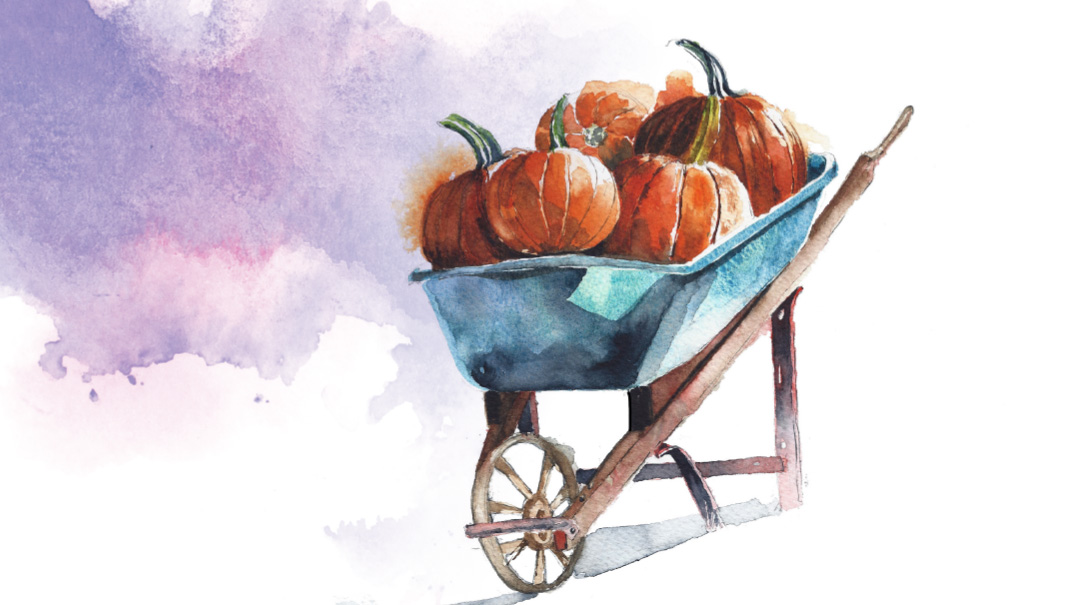
Roots
Millie Samson
WE needed a break, my husband and I and our teenage son, away from the hustle and bustle of the city. Somewhere where we could wallow in the sights and sounds of the countryside, and near enough so that my husband, who had work commitments and could not take off much time, could join us for Shabbos and the last few days of the vacation.
All holidays start with a map spread on the dining room table and the fun of mulling over different destinations. After much debate, we settled on Gloucestershire, the scene of many wonderful family trips. Then we found the perfect cottage in the small, picturesque village of Painswick, in the heart of England.
It’s almost miraculous to watch the verdant scenery emerge as the urban sprawl gradually recedes, like a butterfly from its chrysalis. The first thing we did after we arrived at the tiny cottage was to go for a walk to drink in the scent of the country. We strolled down to the village shop to buy fruit and vegetables.
He was there when we arrived, tall and gangly, with unruly gray hair and the hint of a beard, dressed in faded shirt and trousers. Merging into the shadows on the other side of the square, he was all but invisible.
We only saw him clearly when he slid out of the shade and began to match our footsteps. By the time we reached the cottage and looked back, he had disappeared. He was there every time we set out to explore the village — each time following at a distance with quiet footsteps. We were bemused rather than frightened.
Then one day, without warning, he ran up to us and shouted, “Shalom!” It was more than a greeting; it was a statement of kinship. Seeing our son in his koppel and tzitzis had awakened something very deep within his neshamah.
We persuaded him to stay and talk. His face was animated as he spoke, recalling his childhood. Pesach Seders. The Shabbos candles with their aura of peace. Yom Kippur, the men robed in white like malachim.
It was the tale of centuries. Of families gradually drifting far from their roots. Of children eschewing traditions. Of the pintele Yid awaked when he saw our son.
We invited him for Shabbos but he never appeared, and we never saw him again. But he lives on in my memory. I can still see his animated face and almost touch, once again, his longing for his roots.
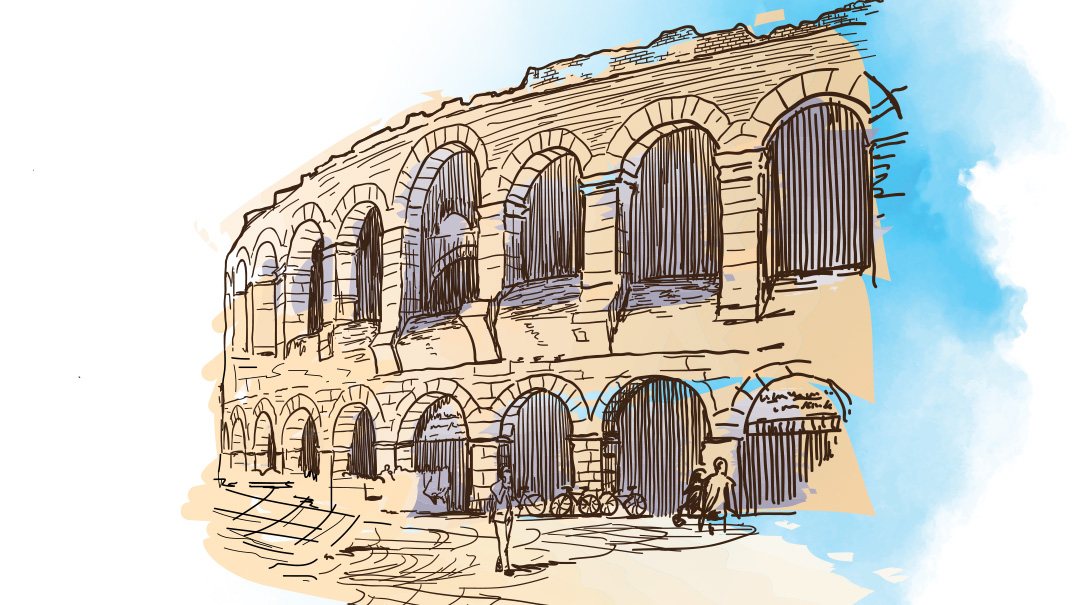
Veni, Vidi, Vici
Sarah Moses Spero
Nine years ago, Abby and I decided to treat ourselves to the Trip of a Lifetime — a five-star organized kosher travel experience to Italy, complete with world-renowned speakers, fabulous cuisine, and matching luggage. This was our first trip past Ashtabula, Ohio (Israel is home and the New York area doesn’t count), so we went all out. Using our accumulated travel points, we upgraded to business class. Determined not to look like out-of-town yokels from Cleveland, I made certain that my eyeshadow matched my earrings. We each have our priorities.
If you’re looking for a Tripadvisor® review, suffice it to say that our kids have titled this experience, “Welcome to Misery; Please watch your step.”
Absolutely anything — and everything — that could go wrong, did. When our plane from Cleveland to Chicago was delayed, I should have taken it as an omen. Instead, trying to find the positive, I looked at this development as a good sign — my nail polish would have time to dry.
I’d felt a little uncomfortable about leaving the day after Tishah B’Av, and I’d piously spoken to our rabbi about packing (when could I do laundry) and wondered if looking forward to the trip was not quite in keeping with the spirit of the Nine Days.
I needn’t have worried.
When our flight from Cleveland to Chicago finally took off, after having been delayed for a third time (message from Heaven?), we knew we’d missed our connecting flights from Chicago to Venice via Brussels, the city in which we were planning to join the rest of the tour group. The airline reassured us that we were now booked for the next flight out, a mere five hours later, and yes, to my great relief, we were still booked in business.
Afraid that we might miss a meal on the way, one of us decided to sweet talk his way onto a better connection that (he thought) would get us there earlier. Here’s where I deserve a gold star. I ignored my instincts, and allowed him to go ahead with it. Thus began our adventure touring Europe — or at least their airports.
We took off from Cleveland on a Wednesday afternoon and arrived in Italy on Thursday evening, with stopovers in Chicago, Brussels, Frankfurt, Antwerp, Amsterdam, and finally Venice. “Don’t say I never take you anywhere.”
The last-minute changes meant that neither our kosher food nor our suitcases made it onto the flights. Fortunately, I’d thrown a few packages of tea biscuits into my hand luggage at the last minute. Our cell phones didn’t work (one of us again) but I reassured myself that though we were completely incommunicado, my children knew the story of Hansel and Gretel, and would eventually find us by following those dropped crumbs through Europe.
When we finally landed at Venice’s Marco Polo Airport, instead of trying to contact our tour organizer, we sat at the airline’s customer service desk clutching an itinerary and tried to explain (Italiano?) where they should deliver our business-class roaming suitcases.
“If they arrive on Friday, send them to the Relais Monaco Hotel in Treviso. If it’s Sunday, send them to Grand Majestic Hotel in Bologna. Of course, if it’s Monday, please send them to Florence, but if it’s later in the day, then you must send them to the Fonteverde spa resort in the mountains of Tuscany. Tuesday it’s Rome, but if it’s Wednesday… just keep them. We’re leaving Thursday morning.” Get the picture?
Fortunately, another member of the tribe from the tour, who had arrived earlier in the day — also sans luggage — had returned to the airport and was in the same office filling out paperwork for his lost suitcase. The baseball cap and errant tzitzis gave him away. We then shared a short 45-minute cab ride to the hotel in Treviso. Our picture-perfect arrival was complete.
I was determined that this trip would be memorable — and believe me, it didn’t disappoint.
We toured Italy through a garlic-press. Our seven-day itinerary included (you do the math): Murano and Burano (which we missed because it was the first day of the tour and we were busy “seeing Europe”), Venice, meeting the gondolier who was brave enough to maneuver the canals with the three none-too-svelte couples seated in his care. No one had to exhibit their swimming abilities, though it was a close call. The truly beautiful Shabbos, filled with divrei Torah, warmth, zemiros, and camaraderie spent amid the peaceful vineyards of Ponzano Veneto.The hauntingly elegant synagogues (and Jewish ghettos) of Padua, Florence, Sienna, Ferraro, and Bologna. And the rolling hills of Tuscany. We spent two full days in the “Glory That Was Rome,” operative word here being “was,” and saw its Jewish ghetto and magnificent shul where we sang together.
There were moments that defy description — the spontaneous singing and dancing that took place under the Arch of Titus rivaled the tear-choked Keil Malei Rachamim that was said at the Colosseum.
We begged and borrowed cell phones from our sympathetic fellow tour members to stay in touch and reassure our family that we were, indeed, fine, and I learned that being a seasoned traveler means not simply believing everything you read in the brochure, packing extra changes of clothing in hand luggage, and not forgetting your positive attitude, your jewelry, and your sense of humor.
Thursday morning, we bid our fond farewells to the two busloads of strangers who’d become family and headed to Leonardo Da Vinci airport in Rome for our return trip home, only to discover that our flight to Washington, where we were scheduled to catch a connecting flight to Cleveland, had been delayed for six hours.
Some things never change.
Arrivederci!
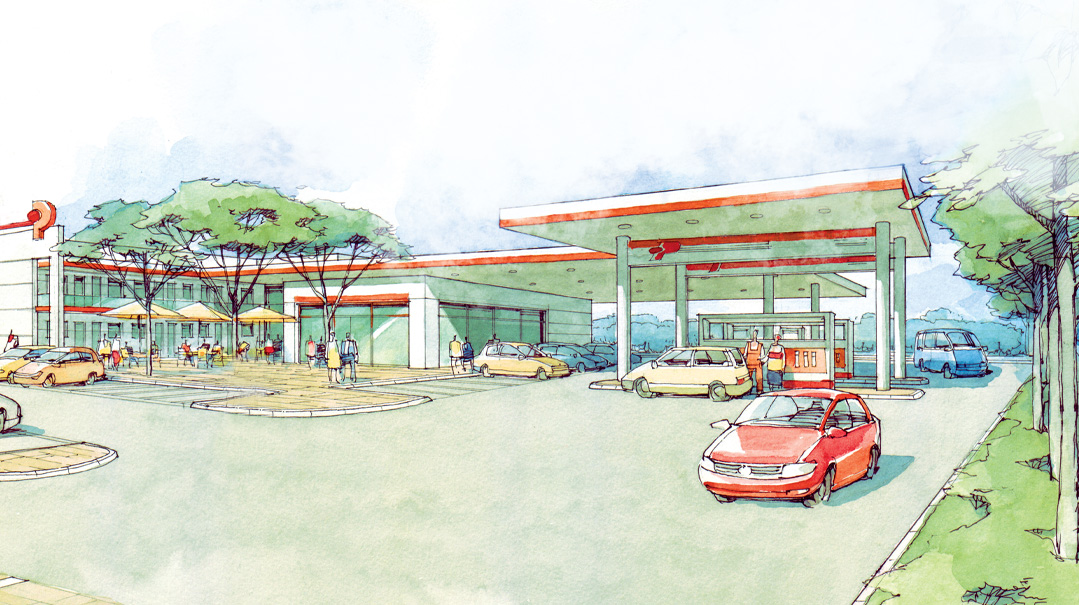
Roadside Relief
Marcia Stark Meth
Traffic’s unusually light for a summer Sunday, and we’re making excellent time. Suddenly…BOOM. Then an awful noise from beneath the car.
My 21-year-old granddaughter’s sharing the seven-hour drive to North Carolina. We’re in one of five cars filled with family members from all over the continent converging on the Outer Banks for our annual reunion. As usual, we’ve been vying to see which carload would arrive earliest, settle in, and get first dibs on the pool. Along the way, we text each other, comparing locations and ETAs.
Now, shaken, Rochel and I wonder: Could it be a blown tire? No, it feels different. Then I realize… maybe it’s my Camry’s plastic undercarriage protector. It got dislodged a couple of years ago. My mechanic had bolted it back on, but warned me it was just a temporary fix.
What to do? The roar of plastic scraping roadway is deafening — and scary. What would happen if it came off completely? Would it cause an accident?
There’s no way I’m pulling onto the shoulder and getting out to check if I’m right about the source of our rumbling. Not with cars speeding by at 80 mph. There are no gas stations along this Virginia stretch of I-95. And the exits are few and far between.
We hobble along, looking for an exit with a blue “Gas” sign. Just as the sign materializes, Waze tells us… Get off at that exit! Heavy traffic ahead. What fortuitous timing!
After exiting, we pull over and inspect: I was right. The shield had split in half. Two plastic monoliths dangling to the ground. We try tugging at each piece, to no avail.
We find a gas station. Slight problem: No mechanic on duty. Oy. This could turn into a looong trip. Should we inform our family cars that we’re in trouble? No, let’s not worry them yet. Let’s see what happens next.
The gas station is part of a mini-mall that has a 7-Eleven. Rochel has an idea. Maybe we can buy a Swiss army knife and cut the pieces away. Nice idea, but no dice — rather, no knife.
We ask the cashier if he owns a personal cutting implement. Better yet, does he know of any nearby mechanic who could help us? No.
I sigh resignedly and tell Rochel to meet me at the car after I make a quick rest stop.
Exiting the store, I find an amazing sight: Rochel standing beside the car, and a pair of legs protruding from underneath. It’s our cashier! Turns out he’s an off-duty mechanic who spends his weekends cashiering at this particular 7-Eleven. He had a change of heart and had gone to his car to retrieve the very implement we needed! Then, he took care of removing the shield for us.
Twenty minutes later, we’re good to go. I offer our savior some cash for his services, but he refuses.
When we finally arrive at our destination, we find we’re just a few minutes behind the others. Most of them had been stuck in that traffic we’d bypassed. We relate our adventures, thank Hashem, and jump into the pool!
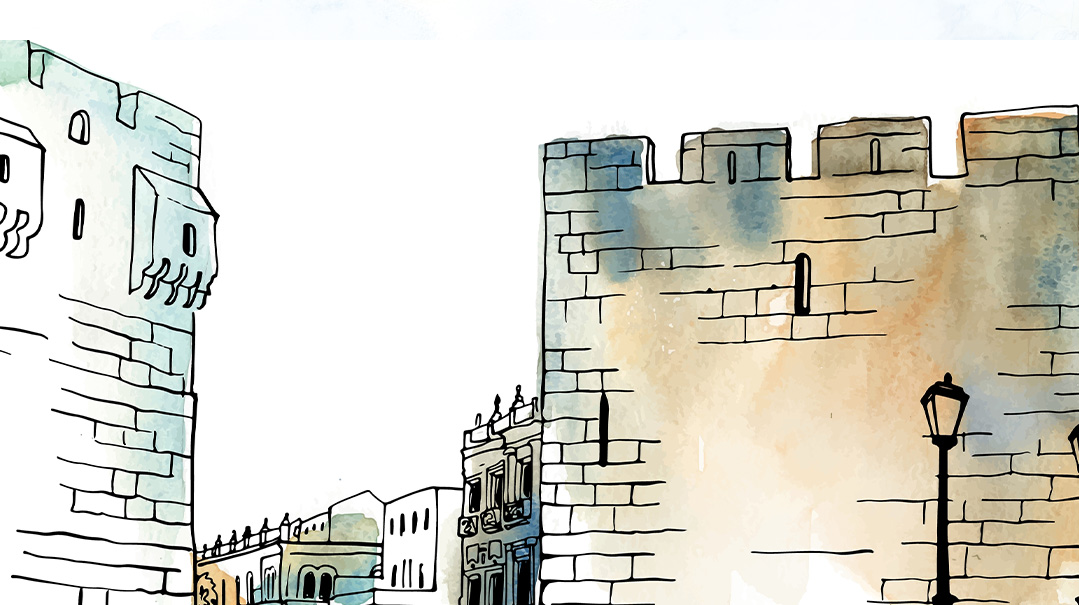
Full Circle
Chaia Frishman
“Stop calling it your Rav Gav,” my thirteen-year-old admonishes as I search once again for my lime-green Rav Kav. (Yes, it’s the millionth time I’ve misplaced it, and of course I find it in the same place, my wallet belt.) We’d made plans to meet our extended family at the Israel Aquarium, followed by a visit to the Biblical Zoo.
I was already stressed; we’d left the house in a huge rush to catch the bus, and zoos are my least favorite day trips. Hiking a mile in the sun to see animals I could easily read up on in a glossy magazine isn’t my idea of fun.
Boarding the first bus Google maps suggested, we drew the attention of a kind woman who listened as we argued about which of the three transfer buses the app suggested to take. (Heard, more than listened. We were a bit loud in our disagreement.) She offered her help, and the sound of her voice transported me back in time 30-plus years.
“I know this is going to sound crazy,” I said, “but are you by any chance related to Rebbetzin R.?” Though this woman in the Sanhedria neighborhood of Yerushalayim looked nothing like Rebbetzin R., everything else about her — her voice and manner — reminded me of her.
“Yes, she’s my sister!”
Bull’s-eye. We started talking, and I was flooded with memories.
Rebbetzin R. has two sisters living in America, both choshuve women, and I knew both of them. Her sister Rebbetzin L. was one of the first women I babysat for, and she’d eventually introduced me to her other sister, Rebbetzin R., whose doppelganger I’d just met now on the bus.
Almost all of my preteen summers in my childhood home in Forest Hills were spent at Rebbetzin. L.’s home. I babysat four little kids in her Burns Street apartment, and would take them on a precarious 15-minute walk to the park across many busy streets.
That successful babysitting stint and the trust Rebbetzin L. had in me guided me toward my present-day career. (I’ve been a teacher for almost 30 years.)
It’s amazing how many people I tend to bump into on my trips to Israel, between Geula, the Kosel, and Rechov Yaffo. Israel always has those Hashgachah stories. But on this particular trip, though I’d been all over, I hadn’t met anyone. Now, sitting on the bus, dreading the long day awaiting me at the zoo, the gift of running into Rebbetzin L.’s sister wasn’t lost on me.
At this point in life, my idea of a vacation is sitting on my porch with a glass of iced tea and a good book. Sitting on the bus after our tense exit that morning, having lost my patience with the two kids who’d joined me for the trip, I felt like an incompetent mother. But remembering Rebbetzin L. and the trust she had in me infused me with a renewed sense of confidence.
On our way home, (after switching buses three times again…) I leaned back contentedly. I’d managed to stay present and enjoy the time with my family and managed to enjoy seeing the giraffes. Then I looked up. There, on the same bus as us again, was Rebbetzin R.’s sister.
“How was the zoo?” my new friend asked.
Our trip had come full circle.
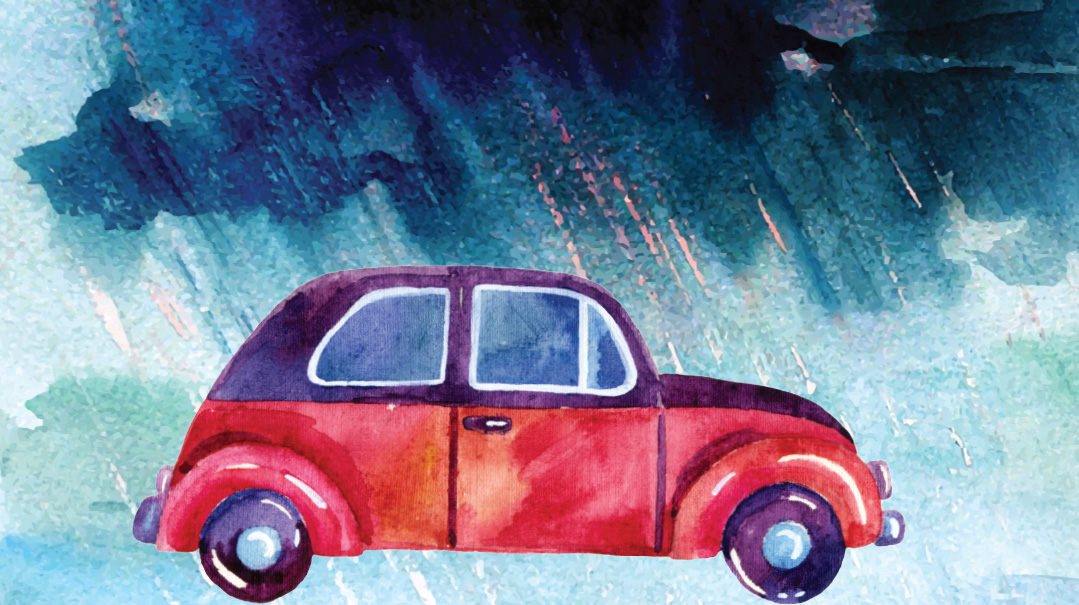
Raining Messages
Elana Moskowitz
E
ons ago, during the period of marriage my husband and I fondly recall as our “young and dumb years,” we decided that a brief vacation alone was an important priority.
Intrepidness has never been our strength, which explains why we declined to mediate tribal unrest in Indonesia or hobnob with the drug cartels of Peru, and instead settled for a brief respite in prosaic Boro Park. Partiality for davening with a minyan may have also been a minor factor in our choice of exotic destinations. To be fair, we planned to cross the state line the next morning and spend a glamorous day in cosmopolitan New Jersey.
A popular method for garnering unlimited time with esteemed rabbanim is holding your rav of choice hostage in your vehicle under the guise of “driving him somewhere.” Providentially, our foray into the wilds of Brooklyn coincided with an opportunity to drive Rav Shlomo Brevda from Long Island to his home in Flatbush. I immediately set to work compiling reams of questions on sundry topics, determined to ensure we not squander even a nanosecond of our precious time with the Rav.
Vacation day dawned inauspiciously dark and drizzly, but we refused to allow the weather to affect our elated mood. We were going on vacation! To another borough!
By the time we swung around to pick up Rav Brevda, though, the precipitation had increased considerably, and my dear spouse had to negotiate an umbrella and accompany the elderly rav through sheets of rain. With admirable dexterity, he escorted a rather damp rabbi to the passenger side of the car, and we hightailed it up the Belt Parkway to Brooklyn.
A mere few minutes into the car ride, (moments before I posed question IV:b, corollary 3) we hit a traffic snag that had the cars stopped dead. My husband and I peered ahead to determine the cause and what we saw left us both utterly speechless.
A hundred feet ahead, the Belt Parkway had morphed into a colossal lake. The incessant rain and notorious conditions of NYC roadways had created a drainage nightmare, and we were about to become unwitting players in the unfolding drama.
We carefully assessed our options. A handful of cars had unsuccessfully attempted to cross the lake and they sat abandoned at different points of passage, sunk to above their tires in rainwater. To our right, the grassy knoll leading up to the service road resembled a graveyard of unsuccessful escapes off the flooded highway. Cars stood immobile in various stages of ascension, tires sunk deep in the soft muddy grass.
Faced with a most amusing game of Pick Your Poison, my husband scrutinized his options: Drive through the lake and possibly drown, with Rav Brevda in tow, or attempt to scale the shoulder of the road and remain there, ossified for eternity. Never one to back away from a challenge, hubby chose option B.
He deftly maneuvered the car up toward the shoulder and began his daring ascent. The car cooperated for a moment or two, inching perilously up the grass, and I began to imagine us as the sole fortunate escapees from the Belt Parkway marshland.
However, within moments I heard the ominous sound of, “vrrrr, vrrrr, vrrrrrrrrr,” as my husband accelerated for his life, with nary a response from the car. This was it: we were quite literally stuck in the mud in the middle of a titanic rainstorm, with an elderly, esteemed rav in the car.
Quailing with fear, my husband moved into high gear. He turned the steering wheel sharply to the right while hitting the accelerator. No response. He flung the wheel to the left, no response. He shifted into reverse, jamming the pedal to the floor; still no response.
Panic set in as he tried every possible maneuver to dislodge the car from the mud: accelerate, reverse, steer right, steer left, hit the defogger, amp up the wipers, open and close the windows, eject the CD, all to no avail. The car refused to budge.
At that moment, as he paused to recoup, my husband glanced at Rav Brevda and observed something that sent his blood pressure straight through the roof. The rav’s head was slumped close to his chest, as if in a deep slumber, his lips moving furiously. Motioning to me, I caught sight of the rav and my mind moved swiftly into catastrophe mode: We’re stuck on the shoulder of the road in a flood, and Rav Brevda is having a heart attack. I was already picturing the next morning’s banner headlines: “Kollel Couple Kills Rabbi During Torrential Rainstorm. Insist on Innocence, Claiming Extenuating Circumstances.”
But before I had a chance to catapult myself into the front seat and summon my rusty CPR skills, Rav Brevda suddenly lifted his head, regarding us with a piercing look and said, “Maybe you should say a perek of Tehillim and ask Hashem to get us out of this mess.”
Oh. That’s what that was happening. Not a heart attack, but tefillah asking Hashem to extricate us from the flooded parkway. To say we were chastened is an understatement. Shouldn’t we, a serious kollel couple, know to turn to the true Giver before embarking on our grand hishtadlus attempts?
Long story short, we made it across the lake and brought Rav Brevda safely home. We even made Minchah.
Years later, upon meeting the rav, he remembered our ill-fated car ride, and quipped, “That was some rainstorm! It was like Noach’s Mabul!”
Except, unlike the victims of that flood, we had internalized the message.
(Originally featured in Family First, Issue 807)
Oops! We could not locate your form.






